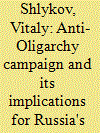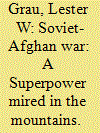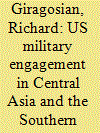|
|
|
Sort Order |
|
|
|
Items / Page
|
|
|
|
|
|
|
| Srl | Item |
| 1 |
ID:
052090


|
|
|
|
|
| Publication |
March 2004.
|
| Summary/Abstract |
The author examines the cross forces at play inside Russia between the govemment and the oligarchs. Why the crackdown on the oligarchy? Various prevailing theories are offered. Among them, perhaps this crackdown was a tactical campaign decision with "guaranteed voter appeal calculated to ensure a first-round victory for Putin." Or perhaps Khodorkovsky broke a tacit pact reached in 2000 with Putin, in which the oligarchs promised to stay out of politics and Putin agreed not to challenge the source of their wealth. The author notes that, "… businessmen are one of the few forces capable of resisting the onset of a new authoritarianism."
|
|
|
|
|
|
|
|
|
|
|
|
|
|
|
|
| 2 |
ID:
052086


|
|
|
|
|
| Publication |
March 2004.
|
| Summary/Abstract |
Reform of the Russian military is required for two reasons: the armed forces' lack of modern equipment, and its growing internal social problems. Fixing these problems will require adjustments at several levels: in funding, in military education, in eliminating corruption and arbitrariness, and in overcoming "old thinking" associated with a Cold-War mentality. Recent statements by the Russian Minister of Defense stating that "military reform is over" cannot help but make one pessimistic about the future of military reform in Russia.
|
|
|
|
|
|
|
|
|
|
|
|
|
|
|
|
| 3 |
ID:
052088


|
|
|
|
|
| Publication |
March 2004.
|
| Summary/Abstract |
Modern non-proliferation ideology and practice were born out of a broadly understood and loosely defined gut-feeling shared by the five original nuclear powers that existing weapons technologies are far too dangerous to be acquired by everyone wishing to acquire them. Thus, non-proliferation practice has been an attempt to keep outsiders as far away as possible from acquiring their own nuclear arsenals, and later other classes of weapons of mass destruction - chemical and biological.
|
|
|
|
|
|
|
|
|
|
|
|
|
|
|
|
| 4 |
ID:
052089


|
|
|
|
|
| Publication |
March 2004.
|
| Summary/Abstract |
Space presents realistic opportunities for US-Russian cooperation. But how can the two countries cooperate while also protecting their own national interests? Can the US afford to go it alone in space? What will be the long-term effect of the commercialization of space? Faced with ever declining space-technology budgets, Russia needs international cooperation if its space industry is to survive. At the same time, the US has shifted its interests away from cooperation and toward the military aspects of space. Further, the author says, the US has been inclined to solve problems unilaterally. But the author contends that the US is critically dependent on Russian launchers and that both countries would benefit from mutual efforts and expertise. Potential areas for joint work include ballistic-missile defense, protecting space-based systems, and data exchange on space objects. All of the foregoing, the author notes, would support national and international security.
|
|
|
|
|
|
|
|
|
|
|
|
|
|
|
|
| 5 |
ID:
052091


|
|
|
|
|
| Publication |
March 2004.
|
| Summary/Abstract |
The Soviet-Afghan War involved more than the Soviets and Mujahideen resistance. Afghan communists (the DRA) were involved in the immediate struggle and a large number of countries supplied the Mujahideen during this "Cold War" hot war. Their struggle and their lessons are outlined. The author does not usually write about footnotes, but he wrote this article during a trip to Iraq and lacked his reference library. Needless to say, he drew on his knowledge about the war and the knowledge he gained from noted authorities on the subject. These include Ali Jalali, Barnett Rubin, Riaz Khan, Mohammad Youssaf, Brace Amstutz, Artem Borovik, Aleksandr Lyakhovskiy, Aleksandr Mayorov, Scott McMichael, Makhmut Gareev, David Isby, Boris Gromov, Rasul Rais, and Louis Dupree.
|
|
|
|
|
|
|
|
|
|
|
|
|
|
|
|
| 6 |
ID:
052087


|
|
|
|
|
| Publication |
March 2004.
|
| Summary/Abstract |
The regions of Central Asia and the Southern Caucasus have each acquired an elevated strategic importance in the new security paradigm of post-September 1lth. Comprised of five states, Kazakhstan, Kyrgyzstan, Tajikistan, Turkmenistan and Uzbekistan, Central Asia's newly enhanced strategic importance stems from several other factors, ranging from trans-national threats posed by Islamic extremism, drug production and trafficking, to the geopolitical threats inherent in the region's location as a crossroads between Russia, Southwest Asia and China. Although the U.S. military presence in the region began before September 11th, the region became an important platform for the projection of U.S. military power against the Taliban in neighboring Afghanistan.
Similarly, the Southern Caucasus, commonly referred to as the Transcaucasus, has long served as a key arena for competing regional powers. For much of the past two centuries, the Transcaucasus has been hostage to the competing interests of the dominant regional actors: Russia, Turkey and Iran. And this historical legacy is matched by the realities and vulnerabilities of the current security situation in the region. The three states of the Transcaucasus, Armenia, Azerbaijan, and Georgia, each face a difficult course of economic and political reform, systemic transition and nation building in a struggle to overcome the legacy of seven decades of Soviet rule.
These two strategic regions also play important roles as "security sentries" along the front line of a dynamic U.S. engagement in response to the emergence of new non-state security threats. But both regions also face more fundamental internal challenges, ranging from an overall deficit of democracy, and the related predominance of "strongmen over statesmen," to economic mismanagement and widespread corruption. These factors significantly impede the reform efforts of these states in transition, and seriously erode the still fragile security environment. It is this set of internal factors that presents the most daunting challenge, however, as the core fragility of these states cannot be effectively overcome simply through policies relying on enhancing their security or military capabilities.
|
|
|
|
|
|
|
|
|
|
|
|
|
|
|
|
| 7 |
ID:
052085


|
|
|
|
|
| Publication |
March 2004.
|
| Summary/Abstract |
With the election of George W. Bush in 2000, the Kremlin had its reservations about the newly elected US president and his administration. For a time, mutual criticism between the two countries seemed to be the rule of the day. Among other things, the US pulled out of the 1972 ABM treaty unilaterally, and Russia prosecuted its war against the Chechen separatists. Then came 9/11, and the two countries found solid ground for mutually advantageous cooperation - the global war on terrorism. But with NATO/Yugoslavia still clearly in the rear-view mirror, and the war against Iraq still ahead, the course of future relations remained unclear. The author examines US-Russian relations as they evolved before and after the war in Iraq and offers conclusions and lessons learned for both sides.
Russia is an important partner in the war on terror and is reaching toward a future of greater democracy and economic freedom. As it does so, our relationship will continue to broaden and deepen.
|
|
|
|
|
|
|
|
|
|
|
|
|
|
|
|
| 8 |
ID:
052092


|
|
|
|
|
| Publication |
March 2004.
|
| Summary/Abstract |
A host of prominent military and civilian specialists critiqued the US led coalition war against Iraq. Their comments reflected a mixture of Cold War thinking on the one hand and a new place to update the Russian armed forces on the other. Those in the latter group demanded that Russian military reform linger no longer, and that lessons learned from what transpired in Iraq be incorporated into Russian threat assessments.
|
|
|
|
|
|
|
|
|
|
|
|
|
|
|
|
|
|
|
|
|